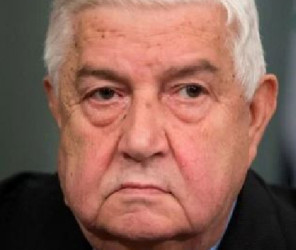BEIRUT (Reuters) – Syria’s government yesterday ruled out any discussion of the presidency or presidential elections at peace talks and criticised the UN envoy overseeing next week’s negotiations.

The opposition in turn accused Damascus of trying to stop the talks before they had started – an exchange that reflected the huge challenges facing diplomats trying to build on a ceasefire deal that has cut violence since February 27.
Foreign Minister Walid al-Moualem confirmed his government’s participation in the talks but said they would fail if the opposition had “delusions that they will take power in Geneva that they failed to take in battle”.
He also heaped criticism on UN envoy Staffan de Mistura for already presenting an agenda for the talks and for his comment that presidential elections would take place in 18 months.
“The government delegation will reject any attempt to put this on the agenda,” Moualem said at the televised news conference.
“We will not talk to anyone who talks about the position of the presidency … I advise them that if this is their thinking, they shouldn’t come to the talks,” he said, addressing the opposition.
The talks will coincide with next week’s fifth anniversary of a war that has killed more than 250,000 people, created the world’s worst refugee crisis, and allowed for the expansion of the Islamic State group.
It is part of the first diplomatic push since the Russian air force intervened in September to support President Bashar al-Assad, reshaping the war his way and helping Damascus reclaim significant areas in the west.
The ceasefire agreement, brokered by the United States and Russia, has been more widely respected than many expected, though fighting has continued on some important frontlines, including near the Turkish border.
The opposition High Negotiations Committee (HNC) has also confirmed its attendance and praised an agenda outlined by de Mistura focused on governance, a new constitution and elections.
The HNC wants to focus on a transitional governing body with full executive powers as outlined in a 2012 Geneva communique drawn up in an early bid to end the conflict.
A UN Security Council resolution approved in December called for the establishment of “credible, inclusive, and non-sectarian governance”, a new constitution and free and fair elections within 18 months.
HNC chief negotiator Mohamad Alloush was cited saying they had come to Geneva to negotiate a transition body without Assad in power. Another HNC member, Monzer Makhous, said Moualem was “putting the nails in the coffin of Geneva”.
Moualem indicated that a “national unity government” was the most on offer – an idea ruled out by the opposition HNC.
Moualem said de Mistura must be neutral and objective. The government delegation would be willing to discuss the agenda, he said, and would travel to Geneva today. But it would return to Damascus within 24 hours if the other side did not show up, he added.
As far as the government was concerned, “political transition” meant a transition from the existing constitution to a new one, and from the existing government to a new one with participation from the other side, he added.
Diplomacy has been complicated by disputes over who should be invited to negotiate with the government.









